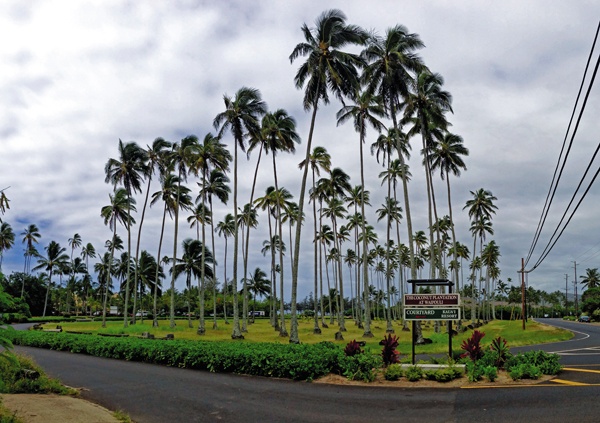LIHUE — The Kauai County Council introduced a bill to fix a glitch on an “exceptional tree” designation for a coconut grove planted 103 years ago. Despite the unanimous support, council members were wary the bill’s final approval may allow
LIHUE — The Kauai County Council introduced a bill to fix a glitch on an “exceptional tree” designation for a coconut grove planted 103 years ago.
Despite the unanimous support, council members were wary the bill’s final approval may allow a generous tax deduction for a new Longs Drugs store being proposed on the protected Waipouli grove.
“I believe there is a state tax deduction of $3,000 per tree for maintenance that can be taken once every three years,” Councilman Gary Hooser said Wednesday. “So, for 100 trees, it adds up, I suppose.”
Longs Drugs is proposing to build a new store on the north end of Aleka Loop in Waipouli, on the exact location where a coconut grove was planted in 1911. The lot originally had 161 trees, and was part of a larger plantation of about 1,100 trees. Out of the remaining 103 trees on the lot, 82 are believed to have been planted 103 years ago.
The grove was designated “exceptional” under Ordinance 227 in 1976. But the land was further subdivided in 1981, and a new ordinance stating the correct tax map keys for the grove is “just merely a housekeeping matter,” according to Deputy County Attorney Jodi Sayegusa.
“The original designation had to do with the whole property, subsequently that property was subdivided into two lots,” said Sayegusa, adding the bill would bring the exceptional tree ordinance back in line with the original designation, which was meant for both lots.
The Kauai Arborist Committee approved June 6 the store’s preliminary plans and Tuesday the Kauai Planning Commission will receive the planning director’s report on the proposal, with an agency hearing scheduled for Aug. 13.
No one at the council meeting Wednesday, however, was able to confirm the developers would be eligible for a tax break.
Sayegusa said she wasn’t familiar with any type of tax benefits to Longs Drugs.
Planning Director Michael Dahilig said he believes “there is some type of credit that is given” to the developer.
Even Hooser, who as a state senator in 2004 voted in favor of House Bill 1848 at the state Legislature, wasn’t “100 percent” sure if the law was still in effect.
He pulled the information after a quick Internet search as the meeting progressed.
HB 1848 was signed into Act 195 on July 9, 2004, by then-Gov. Linda Lingle, according to the state Capitol website. The law allows a tax deduction of up to $3,000 per tree within a three-year period to maintain an exceptional tree on private land and designated by the local county arborist committee.
Sayegusa confirmed to Councilman Tim Bynum that even if the trees are protected by ordinance, it still does not preclude the developers from coming up with a plan to replace them.
The question now would be whether the developers would qualify for a deduction if they replace the trees, given that Arborist Committee members said last month the grove is protected.
The current ordinance and the proposed bill do not single out any coconut tree. Rather, it states the “Coconut Grove” is designated as “exceptional tree.”
Preliminary plans for the new Longs Drugs call for the replacement of the majority of the trees for seedlings, rearranging them in rows to accommodate the store and its parking lot, while seeking to maintain the plantation look of the area.
The argument from an aborist report is that the coconut trees are older than 100 years, and should be replaced because they will not survive much longer.
Pat Cowan, construction director for the project, said at the June 6 arborist committee meeting that developers are looking at purchasing more than 100 trees — “an extraordinary amount for a project of this scope.”
Jerry Nishek, who prepared the arborist report, is the general manager at Kauai Nursery and Landscaping, the company that is supposed to provide the new coconut trees for the project.
Rayne Regush, chairwoman of the Wailua-Kapaa Neighborhood Association, said in that June 6 committee meeting that the Hawaii Revised Statutes emphasize protection of the exceptional trees and does not make exception for commercial uses of the property.
Councilwoman JoAnn Yukimura said the council’s task is “fairly simple,” to complete the official designation of the lot as part of the exceptional tree protection.
“But it really raises this whole issue about development and changing the character of a place,” she said.
Council members agreed a glitch needs to be fixed on the current ordinance, and passed it unanimously at first reading.
The bill now heads to public hearing Aug. 14, before being picked up by the council’s Environmental Services Committee.
• Léo Azambuja, staff writer, can be reached at 245-0452 or lazambuja@thegardenisland.com


